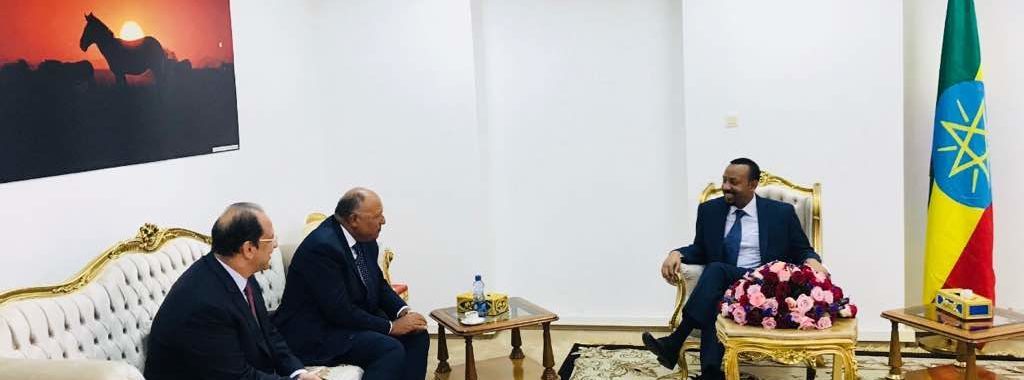The Tuesday talks attended by Egypt’s Foreign Affairs Minister Sameh Shoukry and General Intelligence Service Director Abbas Kamel in Addis Ababa were “positive,” an Ethiopian diplomat tells Mada Masr.
This is despite Cairo’s continued worry about the effect that the Grand Ethiopian Renaissance Dam (GERD) will have on the downstream country’s share of Nile water. An Egyptian diplomat tells Mada Masr that concerns have centered around the pace at which the dam’s reservoirs would be filled, and that this issue is still the subject of “tough and elaborate talks.”
The Egyptian Foreign Affairs Ministry’s statement on the visit notes that it involved discussion on the developments in the dam negotiations, but does not provide specific details.
However, the Egyptian diplomatic source tells Mada Masr that Addis Ababa is still pushing to fill the reservoir over a three-year period in preparation for the first operational phase, while Cairo demands that the filling period be extended to seven years – a compromise between the Ethiopian proposal and Egypt’s initial proposal of approximately 12 years.
“We cannot accede to the three-year timetable, even if we are expecting high floods for the next three years,” says the Egyptian source.
The Ethiopian diplomatic source, on the other hand, tells Mada Masr that Addis Ababa is not proposing that the reservoir be filled over a fixed or predetermined number of years, but that the filling rate should be flexible, taking into account the average rainfall forecast and its expected impact on the water level in Egypt’s Lake Nasser.
Shoukry and Kamel’s visit to Addis Ababa came shortly after Ethiopian Prime Minister Abiy Ahmed criticized and then ousted the military-run Metals and Engineering Corporation (METEC) from a US$4 billion project that is part of the dam’s wider construction, citing numerous delays.
“It is a project that was supposed to be completed within five years, but seven or eight years later not a single turbine is operational,” Reutersquotes Ahmed as saying during a news conference in Addis Ababa on Saturday.
Meanwhile, Ethiopian media sources have reported that the dam workers have gone on strike this week to demand salary raises.
A second Egyptian diplomatic source had told Mada Masr several days before Ahmed’s news conference that Ethiopia “is indeed facing some technical problems with the construction of the dam, but the details are not clear. This means that the filling process, which we know was scheduled to start in a matter of weeks, may be delayed, perhaps even to the fourth quarter of 2019.”
Shoukry and Kamel’s visit aimed in part to learn more about Ahmed’s assessment of the delay to making the first two water turbines operational. This delay was caused, according to the first Egyptian source, by “a technical error” in calculations determining the capacity of the turbines to pump a sufficient amount of water “to attain the expected water level in the dam’s reservoir.”
Cairo fears that this delay may prompt Ethiopia to rush the filling process once the problem has been resolved, according to two official sources speaking to Mada Masr independently of one another.
The Egyptian Foreign Affairs Ministry’s statement also notes that the Egyptian delegation’s visit aimed to “promote stability and peace in the Eastern African region.” Cooperation between Addis Ababa and several countries– including the UAE – was explored during the meeting with Ahmed, according to the Ethiopian source.
An Egyptian researcher on the Nile basin tells Mada Masr that Ahmed has an idea to form a regional force to oversee Red Sea security, something he presented to Cairo for initial consideration during a visit to Egypt earlier this year. Cairo promised to look into it, said the researcher, adding that Cairo’s interest in the issue is prompted by increasing Emirati activity to obtain security and commercial control over the Red Sea.
Meanwhile, Mada Masr learned that Ethiopia’s Ambassador to Egypt Taye Atske-Selassie left Cairo to Ethiopia late on Monday night, concluding his diplomatic post. He has been assigned to serve as Ethiopia’s permanent delegate to the United Nations in New York. Atske-Selassie had been serving at as the ambassador to Egypt for fewer than two years since he was assigned the post in early 2017. The position of ambassador to Cairo will be filled by Azanaw Tadesse, an Ethiopian diplomat who previously served in New York and Geneva.
According to another Ethiopian source, Atske-Selassie is headed to the UN headquarters in part due to his having managed bilateral relations between Cairo and Addis Ababa centered on the GERD negotiations very well during an extremely complex time.
Ethiopia is constructing the GERD on the Blue Nile. This tributary supplies more than 80 percent of Egypt’s annual share of Nile water, which Egyptian officials continue to claim is insufficient to cover Egypt’s basic needs.







































